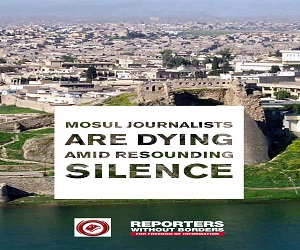Iraqi Kurdistan enjoys vibrant media scene, but remains beset with multitude of problems.
The Kurdish press often falls prey to yellow journalism
The Kurdish press has had a tough year, and is facing numerous challenges that need to be overcome in order to secure its future.
Despite its dramatic growth over the last ten years, the independence, credibility and ethics of the Kurdish media continues to come under scrutiny. Just as daunting are the threats – both legal and physical – that media workers have had to endure, particularly in 2010.
This year marked a turning point in the history of Kurdish media. In May, Sardasht Osman, a young student and writer, was kidnapped and shot dead. He had complained to the authorities about receiving threatening messages after he posted a satirical article about Kurdish officials on a website.
The killing was the most shocking of more than 100 violations against journalists – including physical attacks, harassment and dozens of lawsuits.
The media in Iraqi Kurdistan is deeply divided between party-owned and independent outlets. Almost 900 publications regularly hit newsstands, according to the Kurdistan Journalists’ Syndicate – the overwhelming majority of which are mouthpieces for political parties.
This is an unhealthy situation, exposing journalists to danger, never more so than at election time.
The March parliamentary ballot was particularly heated, with a powerful Kurdish opposition movement, Change, running against the ruling parties. In the past, Kurds had largely been unified under one bloc, but this time the political competition was fierce – and was played out heavily in the media.
The party media was especially brutal in its elections coverage, carrying out smear campaigns and personal attacks against politician and rival media outlets.
During the election period, the Metro Centre to Defend Journalists recorded 50 cases of police, security forces and party members harassing and beating journalists and preventing them from covering stories. It was a trying time for the media that set the tone for the rest of the year.
Kurdish officials complain that the media, especially the independent outlets which are highly critical of the authorities, are unprofessional and only publish negative stories. They also accuse them of siding with the opposition.
In 2010, there were an unprecedented number of lawsuits, with the Kurdish authorities and, in some cases, powerful businessmen, using Iraq’s defamation laws to seek excessive compensation for critical coverage.
In one case, the ruling Kurdistan Democratic Party filed a one billion dollar defamation case against an opposition newspaper after it published a report that alleged the party had made millions of dollars from illegal oil. The legal action, the largest in Iraq’s history, is still pending in court.
Shwan Mohamed, editor-in-chief of the Sulaimaniyah-based independent newspaper Awene, says that currently there are 20 lawsuits against his newspaper and staffers. Earlier this month, he spent five days in courts to deal with the various cases.
“They have affected our work,” he said. “We are more careful of what we publish, even though we are certain of the accuracy of the information.”
In short, some journalists are self-censoring, a dangerous precedent for Iraqi Kurdistan’s fledgling press that not only affects the coverage of stories, but also the credibility of the press.
The Kurdish media’s credibility and its independence are both in question, and for good reason. Officials own most of the media and heavily influence content, using their outlets to get their message out and criticise their opponents – often ferociously.
The independent media is also a victim of the politicians’ games by publishing stories planted by officials without questioning their motives or the accuracy of the information.






.jpg)









